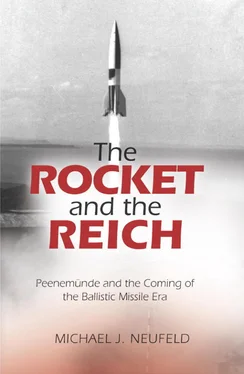Michael Neufeld - The Rocket and the Reich
Здесь есть возможность читать онлайн «Michael Neufeld - The Rocket and the Reich» весь текст электронной книги совершенно бесплатно (целиком полную версию без сокращений). В некоторых случаях можно слушать аудио, скачать через торрент в формате fb2 и присутствует краткое содержание. Город: Washington, Год выпуска: 2013, ISBN: 2013, Издательство: Smithsonian Books, Жанр: История, military_weapon, на английском языке. Описание произведения, (предисловие) а так же отзывы посетителей доступны на портале библиотеки ЛибКат.
- Название:The Rocket and the Reich
- Автор:
- Издательство:Smithsonian Books
- Жанр:
- Год:2013
- Город:Washington
- ISBN:978-1-58834-466-3
- Рейтинг книги:3 / 5. Голосов: 1
-
Избранное:Добавить в избранное
- Отзывы:
-
Ваша оценка:
- 60
- 1
- 2
- 3
- 4
- 5
The Rocket and the Reich: краткое содержание, описание и аннотация
Предлагаем к чтению аннотацию, описание, краткое содержание или предисловие (зависит от того, что написал сам автор книги «The Rocket and the Reich»). Если вы не нашли необходимую информацию о книге — напишите в комментариях, мы постараемся отыскать её.
The Rocket and the Reich — читать онлайн бесплатно полную книгу (весь текст) целиком
Ниже представлен текст книги, разбитый по страницам. Система сохранения места последней прочитанной страницы, позволяет с удобством читать онлайн бесплатно книгу «The Rocket and the Reich», без необходимости каждый раз заново искать на чём Вы остановились. Поставьте закладку, и сможете в любой момент перейти на страницу, на которой закончили чтение.
Интервал:
Закладка:
I await further orders. 21
What Dornberger hoped to accomplish through such a visit is not entirely clear, but perhaps he sought to express as diplomatically as possible his objections to the proposed bunker.
Himmler did not convey the request to Hitler until his visit to East Prussia on January 23. The Führer turned down the proposed audience. A few days later Stegmaier visited Berger, accompanied by Dornberger’s chief of staff, Thom. The head of the Development Works carried with him a letter he wrote conveying a new Dornberger request: that Himmler intervene with Hitler because of problems in the electronics industry.
It is urgently necessary that A-4 program be given a higher priority than the radar program through an order of the Führer. This can be justified with the argument that the A-4 has the character of an offensive weapon while radar is a part of the defense. [The preference for offense over defense was basic to Hitler’s strategic thought.] All previous attempts to achieve this status for the A-4 have either failed or been ineffective.
Dornberger was dissatisfied because Speer refused to follow through on a promise to favor the A-4 over radar; perhaps the Minister realized that the anti-aircraft defense of the Reich was in enough trouble already. In any case, Himmler told Berger to do what he could to support Dornberger’s request. On February 10, a week after the devastating news of the surrender of the encircled Sixth Army at Stalingrad, he asked the Führer again if the Peenemünders could have an audience. As before, he had no luck. 22
Hitler’s attitude toward the rocket program in this period is opaque, to say the least. His approval of A-4 production and deployment hardly suggests that he was skeptical of the missile. Yet Dornberger’s memoirs make much of the Führer’s alleged dream in March 1943 that “no A-4 would ever reach England.” There is no evidence that the dream had any impact on the missile program, and the only evidence that it even happened is Dornberger’s recollection. The actions of Speer and Degenkolb clearly demonstrate that the A-4 had become one of the highest priorities of the Third Reich. Himmler also wrote to Milch on February 3 that the Führer was keenly interested in rocket development because it would be “a very decisive weapon for the future.” 23
It is nonetheless true that Hitler still refused to accede to Himmler’s requests or to give A-4 production a “DE” rating—hardly a questionable decision in view of Germany’s strategic dilemmas and the rocket program’s lack of military sense. Of course, Hitler never really grasped the latter point, nor did he gain from his many meetings with Speer any further understanding of the technology. He apparently still thought of the A-4 as a large artillery shell, because in early January he asked that his Minister investigate the possibility of blasting it from the barrel of the giant 80-cm siege mortar “Dora.” Dornberger was left with the delicate task of explaining in writing why the idea was fatuous. 24
Thus Dornberger’s attempts to circumvent Speer and reach Hitler through the Stegmaier–Berger–Himmler connection were ineffective. That outcome, however, was not the true significance of his action. The chief of the Army rocket program had brought the power of the SS into his own domain, even though he would complain loudly about it in his memoirs. Given Himmler’s relentless empire-building and his conviction that his organization was the most zealous and efficient tool for carrying out Hitler’s wishes, he would probably have taken an interest anyway. But Dornberger’s actions, bolstered by Stegmaier’s enthusiasm for the SS, gave the Reichsführer-SS every reason to hope that he might eventually bring the program into his orbit. 25
Himmler might have taken further encouragement from another fact: Wernher von Braun was an SS officer. In 1947 von Braun offered this explanation to the American authorities:
In spring 1940, one SS-Standartenführer (SS Colonel) Mueller from Greifswald, a bigger town in the vicinity of Peenemünde, looked me up in my office… and told me that Reichsfuehrer SS Himmler had sent him with the order to urge me to join the SS. I told him that I was so busy with my rocket work that I had no time to spare for any political activity. He then told me that my being in the SS would cost me no time at all. I would be awarded the rank of a “Untersturmfuehrer” (lieutenant) and it was a very definite desire of Himmler that I attend [sic] his invitation to join….
Realizing that matter was of highly political significance for the relation between the SS and the Army, I called immediately on my military superior… Dr. Dornberger. He informed me that the SS had for a long time been trying to get their “fingers in the pie” of the rocket work. I asked him what to do. He replied on the spot that if I wanted to continue our mutual work, I had no alternative but to join. He added that he hoped our old cordial relation of confidence would avoid any future difficulties that could arise.
After having received two letters of exhortation from Mueller, I finally wrote him my consent. Two weeks later, I received a letter reading that Reichsfuehrer SS Himmler had approved my request… and had appointed me… [to] the staff of Obergruppenfuehrer [General] Mazow [Mazuw], [in] Stettin (Whom I did not even know).
Dornberger must have been concerned about offending Himmler at a time when the priority of the program was threatened. Whatever his reasons were for pushing his subordinate to join, von Braun’s membership officially commenced on May 1, 1940. After receiving promotions in late 1941 and late 1942, the Development Works’ Technical Director held the rank of Hauptsturmführer (Captain). 26
Von Braun’s statement is self-serving, but other evidence confirms the impression that he was motivated primarily by a desire to continue working on his lifelong obsession, rocket development, whatever the moral cost. Gerhard Reisig, head of the measurement group, remembers that von Braun asked a small group of engineers: “Should I do it or not do it? Would it help me or would it be bad for me?” His previous actions also show him to be an opportunist. The brilliant young aristocrat had a conservative and nationalist upbringing, but he had showed no particular ideological enthusiasm for National Socialism in his youth. In November 1933, while he was studying at the university and working at Kummersdorf, he had joined a Berlin SS unit that offered horseback riding. He may have done so only as recreation and as a demonstration of political loyalty at a time when the Nazis were consolidating their control. He was given the lowest rank, “SS candidate,” but dropped out after half a year. 27
At the end of 1937 an unnamed authority “officially demanded” that he join the Nazi Party. During that year membership had been reopened for individuals of social significance. At least two or three other leading Peenemünders were also asked to join at that time. In general, the Army was able to keep the Party from playing an important role in the complex, but a sample of twenty-eight prominent Peenemünde engineers and scientists shows that thirteen or fourteen became Party members and four, including von Braun, were in the SS. A few, like Arthur Rudolph (a member since mid-1931), were ideologically committed Nazis, but the survey confirms the impression that von Braun was fairly typical. He and his colleagues were motivated first and foremost by a desire to advance themselves and their work, compounded perhaps by enthusiasm for the foreign and domestic “accomplishments” of National Socialism. Anti-Semitism may also have been important for a few individuals, but most, like von Braun, were apathetic about the issue. During the war it was also not wise to ask too many questions about the fate of the Jews. 28
Читать дальшеИнтервал:
Закладка:
Похожие книги на «The Rocket and the Reich»
Представляем Вашему вниманию похожие книги на «The Rocket and the Reich» списком для выбора. Мы отобрали схожую по названию и смыслу литературу в надежде предоставить читателям больше вариантов отыскать новые, интересные, ещё непрочитанные произведения.
Обсуждение, отзывы о книге «The Rocket and the Reich» и просто собственные мнения читателей. Оставьте ваши комментарии, напишите, что Вы думаете о произведении, его смысле или главных героях. Укажите что конкретно понравилось, а что нет, и почему Вы так считаете.












